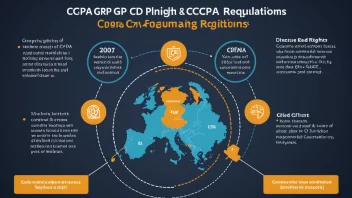In today's digital age, data privacy compliance is a critical concern for e-commerce businesses. As online shopping continues to grow, so does the responsibility of businesses to protect consumer data.
Data privacy refers to the proper handling of sensitive information, including personal identification, payment details, and browsing behavior. Compliance with data protection regulations is not just a legal obligation; it fosters trust between businesses and consumers.
Several key regulations govern data privacy in e-commerce, including the General Data Protection Regulation (GDPR) in Europe and the California Consumer Privacy Act (CCPA) in the United States. These laws require businesses to implement specific measures to protect consumer data and to be transparent about how that data is used.
A vital aspect of data privacy compliance is obtaining informed consent from consumers before collecting their data. E-commerce platforms must provide clear and accessible privacy policies that outline what data is collected, how it will be used, and the rights consumers have regarding their data.
Data security is another cornerstone of compliance. E-commerce businesses must utilize encryption, secure payment gateways, and robust cybersecurity measures to protect sensitive data from breaches. Regular audits and vulnerability assessments can help identify potential weaknesses in a company's data protection strategies.
Additionally, businesses must train their employees on data privacy best practices. All staff members, especially those in customer service and IT, should understand the importance of data privacy and be equipped to handle sensitive information responsibly.
One of the challenges e-commerce businesses face is managing data across multiple jurisdictions. As laws vary by region, companies must ensure they comply with all applicable regulations where they operate. This may involve localizing privacy policies and data handling practices to meet regional requirements.
Case studies of companies that have successfully navigated data privacy compliance can provide valuable insights. For instance, a well-known online retailer implemented a comprehensive privacy program that included end-to-end encryption and a user-friendly consent management system. As a result, they not only achieved compliance but also enhanced customer loyalty and trust.
In conclusion, navigating data privacy compliance in e-commerce is imperative for businesses looking to thrive in a competitive marketplace. By understanding regulatory requirements, obtaining informed consent, ensuring data security, training employees, and learning from successful case studies, e-commerce businesses can protect consumer data and build lasting relationships with their customers.






